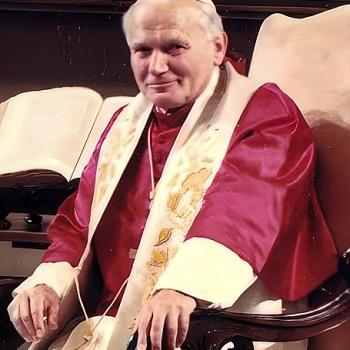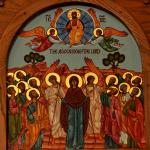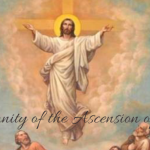I know a little about use of terms for movements, having majored in sociology. The “radical Catholic reactionaries” are those who want to go too far: they want to “reform” the Church so much that it does become radical almost precisely in the original Luther sense (revolutionary / overturn / uproot / revolt). They are so opposed to liberalism that they go full circle and become one themselves by dissing popes. They start out opposing Protestantism and then adopt key aspects of same (again, dissing popes, dissing Church authority, councils, officially promulgated forms of the Mass, and the Catholic Mind).
Thus, “radical” used here: going to the roots, refers to going to the very roots of Catholic ecclesiology: the papacy, and digging it up. That’s not a dis-use of “radical”. It’s exactly what it means. It can be used more than one way (like most words), but my use is not improper.
Most of those that I call reactionaries are not canonically schismatics. They are Catholics in the legal sense. It’s a far larger category (the ones I describe, complaining about and trashing everything in the Church) than sedevacantists or SSPX. Reactionary is in my usage, to the left of SSPX. It doesn’t go that far. If I’m talking about SSPX or sedevacantist (both true schismatics), I call them that.
Many approach these issues legally or canonically, whereas I approach it as a matter of the spirit of the thing: much like Jesus approached the Pharisees, and Sadducees, too, for that matter, and how Jesus and Paul both reinterpreted and reapplied the Law. It goes beyond mere legality. It is a divisive, quasi-schismatic spirit. I’m trying to prevent folks from possibly descending into wacko schismatic land.
My concern is far wider than that. Reactionaries are not just trashing abusive Masses (where I fully agree with them), but the OF Masses, period: even if they are perfectly done, by the rubrics. They go after it in its essence, not after its abuses only. They do the same with Vatican II. The legal sense is not all there is. Reactionaries are divisive. They sow discord and disrespect for Holy Mother Church. They adversely affect the confidence and faith of Catholics.
As an apologist I have to have some sort of way to distinguish between mainstream “traditionalists” who simply prefer the Tridentine Mass, and reactionaries. If I make no differentiation, I catch hell for supposedly lumping every sort of “traditionalist” together, as if I consider all of them extreme fringe wackos (which I do not at all). If I use the term “traditionalist” only, then I can’t even make the critiques I make of excesses and errors, because people will think I’m bigoted and attacking the whole movement across its entire spectrum.
Also, St. Paul vociferously and repeatedly condemned sectarianism and folks who were causing division.
The problem still remains of how to identify a clear and troublesome category of folks. We need to have a name for them. We can’t use a 17-word sentence every time they are referenced. Language doesn’t work that way.
We can come up with any number of alternate terms: the people involved will be offended whatever we do. “Ultratraditionalist” has been used; I used to use “quasi-schismatic.” People use a variety of epithets that are simply insults (“wackos,” etc.). One person I was dialoguing with suggested “rude jerk.” Like that will go over very well? :-) But “rude jerk” does not identify the essential problem; it’s not primarily a matter of behavior (apologetics analysis in general is about belief, not behavior), but rather, of the “us vs. them,” legalistic, exclusivistic, Pharisaical views being espoused.
My job as an apologist is to critique and refute error and to try to prevent people from being 1) harmed by it, and 2) falling into it themselves. It’s easy for the non-apologist to say, “well, don’t use this term because it’s mean and causes problems.” I’m happy to discuss whether my chosen term is inadequate or uncharitable, and whether it should be discarded, but I need an alternative, because we still have the practical issue of identification for a distinct group.
I have gone through almost identically the same dispute concerning “anti-Catholic,” which has a long, indisputable, perfectly legitimate use among scholars. People don’t like being labeled that. But there is such a group. I am far more offended by the belief-system and lies of those who are correctly called that. They oppose Catholicism. I oppose abortion and have no problem with “anti-abortionist,” so why should an anti-Catholic object to a simple description of what is so plainly their beef?
The beliefs that reactionaries espouse and how they view orthodox Catholics are infinitely more uncharitable and offensive and outrageous than whatever name we have in the past or will in the future call them. But I guarantee as sure as I’m sitting here that I’ll catch hell no matter what term is used. I could call them anything whatsoever and it won’t matter, because they reserve the right to use their offensive terms of orthodox Catholics, while we are supposed to have no “right” at all to identify them.
They’re simply “traditionalists,” according to their self-description, but the whole point is that they are not just that (and it insults the mainstream “traditionalists” to contend that they are), and so have to be identified more specifically. Another thought occurred to me. For a reactionary to say that he is simply a “traditionalist” insults the vast majority of legitimate “traditionalists” in much the same way as a Mormon or Jehovah’s Witness or Unitarian calling themselves “Christians” is an insult to ones who truly are Christians (who accept the Trinity, divinity of Jesus, etc.). And these groups always reject our classification of them as “heresies” or “heretical sects” or “cults.” It’s the very co-opting of the term to describe the narrow, objectionable group, that is completely unacceptable.
I don’t deny that radical Catholic reactionary has a certain pointedness and tweaking “bite,” but not nearly as much as Jesus’ “vipers” or “whitewashed tombs, full of dead men’s bones” or calling Herod a “fox” (or St. Paul describing some people, “whose god is their belly”). I think it is fully justified and as charitable as it can be under the miserable circumstances. Definition of terms is absolutely crucial for rational discourse to take place. We have to know exactly who we are talking about, so there is not further confusion. The only way to do that is to use terms consistently and to define them with great care.
But people will still be offended no matter what, because that is what happens when you disagree with folks. It goes with the territory in apologetics, along with being personally attacked ourselves because we dare to say that “a is right and b is wrong.” People don’t like that. It’s human nature. This is why the racist virtually never agrees that he is one or should be called that.
Do we stop using the terms “racist” or “bigot” or “prejudiced person” because of this? No! The political liberal wants to run from that term, even when it is clear that it is applicable and descriptive. Pro-abortion people want to play games with words and use “pro-choice” so they can cover up what it is they advocate (abortion on demand). Even many Protestants don’t want to use that word of themselves and want to call themselves “Christians”: as if that is helpful to identify what they believe. That problem will never be solved (of people not liking their title given to them by someone else).
Again, some say that I shouldn’t use any term at all, but it’s not possible to do that as an apologist who is identifying an error and critiquing it. Its absolutely necessary to have some identifying term, as one can’t write a long sentence every time someone in the group is referenced. If I can’t use a name for the phenomenon I am critiquing, then I can’t critique it at all, pure and simple. And I think it should be critiqued and refuted, as it is a dangerous, spiritually deadly movement, drawing people in every day.
I can’t just refuse to use any labels, because some might misuse labels. That holds true for anything whatever, as any good or true thing can be distorted and abused. We can’t throw the baby out with the bathwater.
Real “traditionalists” were described by Catholic Answers Live host Patrick Coffin, in an article on the website for CA (12 July 2013):
Tim [Staples] took special pains throughout the broadcast to distinguish this phenomenon from the kind of “Traditional Catholics” who exhibit often heroic public witness to the Faith: that merry band of Latin-Mass-going, chapel veil-donning, homeschooling, nightly rosary-praying, great books-loving Catholics. In the courage of their faith and willingness to share it, these salt-of-the-earth Catholics deserve emulation.
Take for example their invariably bold public pro-life commitment. Drive past any abortion facility in America or Canada and among the prayer warriors on the sidewalk you’re bound to find at least one such Catholic. They love the pope, they love the beautiful Extraordinary Form (the Traditional Latin Mass), they love big families, and they love our Lord Jesus Christ and his mother.
***
The sexual revolution is far more responsible for those things than either the Novus Ordo per se or abuses of same (where we — at least I — would wholeheartedly agree with “trads”). Belief that celibacy is impossible obviously works against numbers of celibate priests. Loss of faith comes from many sources, but usually primarily the prevalence of secularism and sin in the larger culture. Lousy catechesis, schools, and seminaries don’t flow from the Novus Ordo; they come from a prior liberal theology and/or loss of faith.
All of those things are prior to the Novus Ordo or abuses that come from laxity and ignorance. The primary causes lay much further back. It’s utterly simplistic and downright silly to solely or primarily blame what we see on the New Mass (or Vatican II). The Church has rebuked this notion anyway, so it becomes a matter of thinking with the Mind of the Church or not. The reactionary doesn’t and won’t, and this is what distinguishes them.
***
Bill Strom asked: “Would it be ok to call Catholic Answers Neo-Catholics?”
No; it’s not okay to call any orthodox Catholics that. And if one does, one is guilty of gross calumny, as he or she also is by defining orthodox Catholics as liberals or in bed with liberal modernist dissidents (as reactionaries routinely do). They make it a regular practice of lying and bearing false witness about others. This is one thing that is so insufferable about them, and that removes them from civil, rational discourse.
[someone else] “I disagree with the premise that the term “radical” is not disparaging.”
I’ve often called myself a “radical Christian” (as a Protestant) or “radical Catholic”: meaning that I accept all of it and don’t pick and choose. So obviously to me it was not a self-insult. It’s not inherently an insulting term.
***
The liberal / dissident / modernist / heterodox / cafeteria Catholic (McBrien, Kung, Curran et al) never ever likes to be called any of those terms. They call themselves “progressives” or some such. They think they are orthodox and “normal” Catholics. But they ain’t. Those who are in error never like to be called for being in error, let alone be called by a name that expresses this. Same with reactionaries: the same exact dynamic on the other end of the spectrum. But the reactionary shares many traits with the liberals (and Protestants).
***
When you do theology and apologetics it is absolutely necessary to precisely define categories. The Church has always had “labels” for folks who were in serious error. Ever hear the term “heretic”? How about “apostate” or “schismatic” or “excommunicated” or “sectarian” or “rigorist”?
***
I can define radical Catholic reactionary in 23 words:
“self-righteous, pharisaical, more-Catholic-than-the-pope Catholics who incessantly bash the Novus Ordo, Vatican II, popes since Pius XII, and ecumenism.”
Now, if I am critiquing this viewpoint (and it is that and has definite sociological parameters and manifestations, so that it is properly regarded as a class or group), it has to have a name, because a writer can’t write the whole definition out every time it is referenced. No one does that. To do so would be absurd and boorish and tedious in the extreme for readers.
We still need a name. It’s a very practical problem of needing a name or identifier. It need not be intrinsically “insulting” at all. But, as I have argued, heretic and schismatic or apostate, etc., are not all that fondly viewed, either. Yet the Church has massively used them. Reactionaries are Catholics who are partially out of line with how Catholics ought to think about issues and be in obedience to Holy Mother Church. They have a serious deficiency and don’t think with the Mind of the Church (or as Pete Vere would say, they don’t have a “Roman mindset”). They think too much like liberal dissidents or Protestants. Pick and choose what they like and don’t like . . .
***
Jesus used the phrase “vipers” and “whitewashed tombs, full of dead men’s bones” — referring to people whose teaching had authority and was to be obeyed (Jesus said both things about the Pharisees: Matthew 23-24). St. Paul wrote a number of very tough things to the Galatians and Corinthians (I can dig them up if anyone disputes this), while still regarding them as “churches.” Jesus did the same with the seven churches in Revelation.
When our Lord Jesus called the Pharisees “vipers” and other “epithets” while at the same time urging His disciples to follow their teaching, did He lack love for the Pharisees? How in the world could St. Paul call the Galatian Christians “churches” (Gal 1:2) and then say four verses later that they were “deserting” God and “turning to a different gospel”? He called them “foolish” (Gal 3:1, 3). Is that an example of terminology that Christians ought not use to “label” other Christians, too? Later, Paul says, “I am afraid I have labored over you in vain” (Gal 4:11; RSV as throughout). Paul says all these things, yet ends as he began, calling the Galatians “brethren” (6:18).
Our Lord Jesus was far more of what Kevin Tierney would say is “uncharitable” and exhibiting concupiscence (using his reasoning) when He rebuked the seven “churches” of Revelation. He tells the Ephesians, “you have abandoned the love you had at first” (Rev 2:4). Imagine the huge ruckus that would ensue if I had said that reactionaries have abandoned God and their love for Him? But Jesus said this about those whom He still regarded as Christians. To the church at Sardis, Jesus said, “you are dead” (Rev 3:1). To the Laodiceans, Jesus said, “because you are lukewarm . . . I will spew you out of my mouth” (Rev 3:16) and says, “you are wretched, pitiable, poor, blind, and naked” (3:17).
Ah, then Jesus sums up, “Those whom I love, I reprove and chasten . . .” (Rev 3:19). That’s just it, isn’t it? Hard names and descriptions are totally consistent with charity and love and a desire for those in error to come out of it. Jesus and Paul are our examples. I try my best, always, to follow their example. Fall short all the time, but I try, as an apologist who has to deal with error all the time, by learning their model and godly examples. Accordingly, I see reactionaries as Catholic brethren; never have not done so, while at the same time I critique them strongly.
Jesus and Paul talked to these wayward churches in extremely negative terms while not for a second denying that they were Christians and in the fold. The two are not mutually exclusive. That is the biblical and Catholic “both/and” as opposed to “PC” pseudo-tolerance and touchy-feely Frisbee-throwing “love” of a sort that is very prevalent nowadays. We never want to (in this mentality) exercise “tough love” and call a spade a spade, no matter how outrageous and pathetic reactionary rhetoric gets (and it is that, believe you me).
Some folks do mislabel people incorrectly as more radical than they are. I do not. People exhibit all kinds of shoddy thinking and categorization. I try my best to not ever do that. If I’m wrong in individual cases, I fess up.
***
What can I do but direct folks back to my papers where I make the distinctions plain and I think, clearly so? All one can do is lay out their case. If people don’t understand it, then they gotta read it again or ask clarifying questions.
The problem with the larger discussion is that it is mostly subjective and emotional, whereas it should be rational and theological and take into account the relevant linguistic considerations.
“Radical” means, literally, “taking things to the roots.” “Radical Catholic reactionary” has some internal reference to how they see themselves: they think they have gotten to the root of the problems (that they’re being “radical” in that sense) in the Church: locating them in the classic four identifiers of reactionaries:
1) Vatican II.
2) The Novus Ordo / OF Mass.
3) The popes since Pius XII.
4) Ecumenism.
Thus, the reactionary sees himself or herself as a Catholic (which I also freely grant) getting right down to the roots and “brass tacks”: these four things and related stuff have wreaked havoc in the Church, in their mind, and they think they are insightful and wise and radical in identifying them for what they are, whereas the rest of us reality-deniers have our heads firmly in the sand.
The problem is that they are dead-wrong in their analysis of the causation of the serious problem of modernism and laxity in the Church, “on the ground.” But they see it as radically identifying the problems. In that sense, even radical Catholic reactionary is in a way, a nod to their own self-perception, which is one of the reasons I think it is an acceptable and useful term to use.
They won’t like “reactionary” (no doubt) but there is little that can be done about that. It’s a very accurate and apt title, to distinguish their extremity. They think we don’t react enough to problems. We say they overreact and incorrectly react.
***
I’m sick to death of being misunderstood and mischaracterized, concerning this whole mess, so part of my motivation, admittedly, is to try to minimize that, as well as to make mainstream “traditionalists” more happy about the terms I use. I can handle the flak that comes my way, but I am entitled to be sick of it and disgusted at being falsely characterized. I’m a human being like anyone else.
And I want it made crystal clear that I’m talking about an existing objectionable category that is not schismatic, or nearly so, like the SSPX and the sedes. That’s very important to my purpose: to point out that there are schools of thought and tendencies that lead to the far more serious errors: that must be exposed and refuted: shouted about from the rooftops in a more or less “prophetic” mode.
I wanna hear from you “traditionalists” out there. I’m mostly on your side. I’m not against you! I’m your ally, though not one of you, strictly speaking. We have a great deal in common.
***
I don’t seek dialogue with reactionaries. It’s one of the groups, along with anti-Catholic Protestants, that I no longer waste my time with. I’m trying to warn “traditionalists” and non-trads of their errors. If giving them a different name helps in that goal, then I’m all for it, since the goal is key, not the term, whatever it turns out to be. The term is a means to the end, so to speak.
***
The reactionary uses “neo-Catholic” or “Novus Ordo Catholic” or “conciliar Catholic” etc. He views such people as sub-orthodox and sub-traditional. Calling oneself “orthodox Catholic” (if one must qualify “Catholic”) cuts through all that crap, because of the solid historical pedigree of the word “orthodox”.
The non-trad often also gets accused of taking every papal word as GOSPEL TRVTH. If the pope tells us to wear green pants, that’s infallible. If he says you have to blow your nose on odd-numbered dates with a full moon only, that’s infallible and de fide dogma. It’s a ridiculous false charge coming from a ridiculous point of view. Illustrate the absurd by being absurd . . .
Most folks should ignore these clowns. They are in spiritual and theological kindergarten (yet think they are PhD’s in the things of God, who deign to lecture all of us ignorant underling peasants). One has to laugh at the comedic folly of it to stop from crying . . .
***
can say or link to any idiotic thing about the Novus Ordo, but I am supposed to sweet as an angel in never using the slightest “mean” word in describing this rotgut and spiritual poison and disobedience to Holy Mother Church for what it is.
***
“Radical Catholic reactionary” is a good term and the one I coined for the following reasons:
1) “Radical” shows that it is extreme.
2) “Catholic” in there removes the tedious, boorish (never true) complaint that I am supposedly reading the recipients of the term out of the Catholic faith.
3) “Reactionary” is very descriptive of the mentality under consideration: it’s always going back (before Vatican II, back to St. Pius X, etc.), a sort of antiquarianism or making an idol of tradition (often falsely defined).
4) “Trad” not being in there at all removes the objection that mainstream “traditionalists” are being tarred with the same brush, and the dislike towards being considered to be on the same spectrum, no matter how far apart. They’re not at all being so tarred (quite the opposite, actually), but this is the wrongheaded complaint we hear. There is a sociological / theological spectrum, whether one likes it or not (at least canonically speaking), but this term at least doesn’t elicit it.
The fact that all the parties are Catholics is reason enough in and of itself to prove that there is an ecclesiastical spectrum of right and left. One can’t have it both ways. If all are Catholic, then there is a spectrum. If there is no spectrum, then we would have to read the reactionary out of the Catholic faith. What we can’t have, logically, is the reactionary being Catholic, yet not on a spectrum in some very real sense with “traditionalists” and plain old “Catholics.” That makes no sense.
“Traditionalists” have made it abundantly clear that they resent the term radtrad. They think it is either being applied to them (false, in my case) or that it implicates them as in some way connected or associated with the reactionaries that we all know and love. I am trying to take that into consideration, in charity, and for the sake of greater unity and less misunderstanding. The goal is to get “trad” out of any such term, so there is no direct linguistic connection or connotation or what-not.
I will continue to put “traditionalist” in quotation marks, as I always have, in order to protest what I see as the non-necessity and troublesome, elitist-laden connotation (or at least possible connotation) of its use. But as a further bow of courtesy towards my “traditionalist” friends I won’t do that in the title of my web page on the larger controversy.
[note of 10-14-15: actually since the time of this paper I have increasingly tended to not put the word traditionalist in quotations marks, so as to better avoid possible suspicion of intended disrespect. But I won’t go back and change all the old usages. It’ll be an example of “evolving language.”]

















